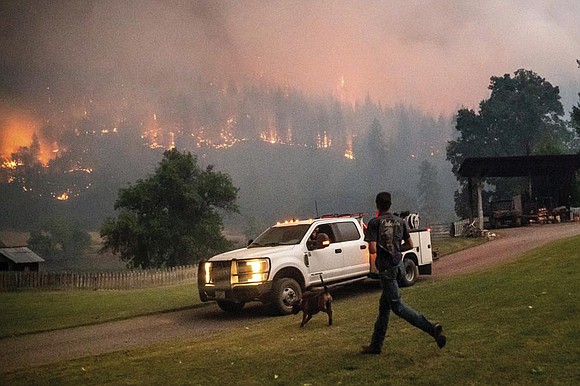Harris cites climate ‘crisis,’ pushes $1B for floods, storms
Matthew Daly/The Associated Press | 8/4/2022, 6 p.m.

WASHINGTON - Vice President Kamala Harris called climate change an “immediate” and “urgent” crisis on Aug. 1 as she detailed more than $1 billion in federal spending to respond to disasters such as deadly flooding in Kentucky and wildfires ravaging her home state of California.
On a visit to Miami, the vice president announced a series of grants being made available to states to help communities across the nation prepare for and respond to climate-related disasters.
Touring the National Hurricane Center before the grant announcement, Vice President Harris said disasters such as the Kentucky floods and California wildfires show “how immediate, how current and how urgent′′ it is to address extreme weather being experienced in the United States and around the world.
“Climate change has become a climate crisis, and a threat has now become a reality,′′ she said in a speech at Florida International University.
Vice President Harris cited deadly floods that have swept through Kentucky and Missouri, “wash- ing away entire neighborhoods,′′ leaving at least 35 dead, including children. At least two people were killed in a wildfire in Northern California that was among several fires menacing thousands of homes in the western U.S. Hot and gusty weather and lightning storms threatened to boost the danger that the fires will keep growing,
“The devastation is real. The harm is real. The impact is real,′′ Vice President Harris said. “And we are witnessing it in real time.′′
In 2021, the United States experienced 20 climate-related disasters that each caused over $1 billion in damage, Vice President Harris said, citing a report by the National Oceanic and At- mospheric Administration. There were about six such disasters per year in the 1990s.
“The frequency has accelerated in a relatively short period of time,” Vice President Harris said. “The science is clear. Extreme weather will only get worse, and the climate crisis will only ac- celerate.′′
The White House is leading a government-wide response to climate disasters that “recognizes the urgency of this moment and our ability to do something about it,” Vice President Harris said,
adding that leaders such as herself and President Biden “have a duty to act, not only after disaster strikes, but before disaster strikes, and that is why we are here today.”
The billion-dollar grant program announced by Vice President Harris doubles spending from last year on programs to defend against extreme weather events across the country. President Biden announced last month that the administration will double spending yet again in the budget year that begins in October, spending $2.3 billion to help communities cope with soaring temperatures through programs administered by FEMA, the Department of Health and Human Services and other agencies.
The Building Resilient Infrastructure and Communities, or BRIC, program, supports states, local communities, tribes and territories on projects to reduce climate-related hazards and prepare for natural disasters such as floods and wildfires. The program is funded through FEMA’s Disaster Relief Fund and the bipartisan infrastructure law signed by President Biden last year.
“Communities across our nation are experienc- ing firsthand the devastating impacts of the climate change and the related extreme weather events that follow — more energized hurricanes with deadlier storm surges, increased flooding and a wildfire season that’s become a year-long threat,” said FEMA head Deanne Criswell.
A total of $1 billion will be made available through the BRIC program, with another $160 million to be offered for flood mitigation assistance, she said.
The grant program is among a series of Biden administration actions intended to reduce heat-related illness and protect public health, including a proposed workplace heat standard.






